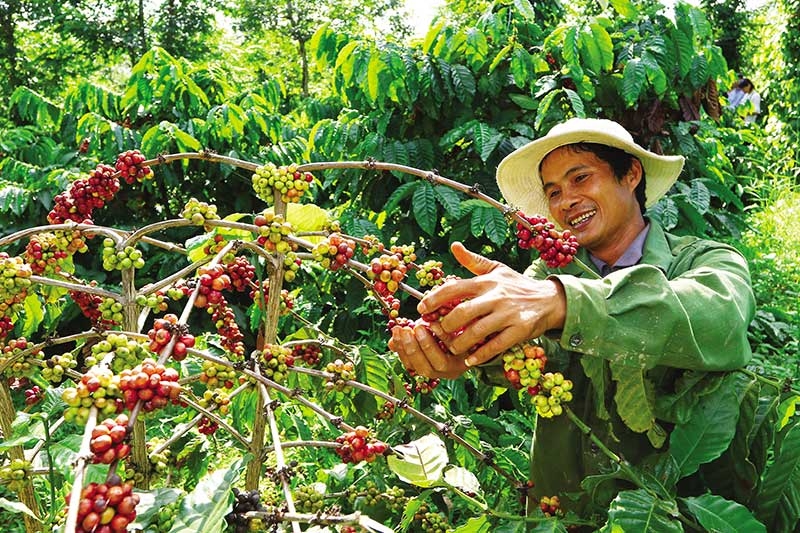Nescafé turns lives around
 |
| Many farmers in Dak Nong province more than doubled their yield with Nescafé Plan, Photo: Le Toan |
“Grown Respectfully”, the new concept that was globally introduced in September this year, encapsulates the work Nescafé has been doing so far, to help farmers grow more and better coffee via the Nescafé Plan’s three pillars – respect for farmers, respect for communities and respect for the planet. Through “Grown Respectfully”, Nescafé conveys real and inspiring farmer experiences that contribute to the coffee taste of great quality to the consumers.
The farming techniques of many coffee producers in Vietnam are outdated and dependent on weather conditions. Also, when crops fail, rural households suffer greatly. Le Hong Thanh, a farmer from the Central Highlighs’ province of Dak Nong, told VIR that his farming techniques used to be rudimentary and he selected coffee beans based on personal observation, without any form of technology. “The quality of our beans was inconsistent and the weather could make or break our crops. Our fertilizer use was also tied to the weather and personal experience, and we knew nothing about sustainability,” said Thanh.
Everything changed when he signed up for the Nescafé Plan to improve productivity and his family’s earnings.
Thanh said that the Nescafé Plan provided him with 1,700 coffee plantlets, as well as practical training and technical assistance on good agriculture practices. Nestlé also helped with the bean selection and required all farmers to keep a farming diary to check the progress of their crop. Moreover, local farmers were recommended to grow other plants to lower risks and diversify their income.
“Thanks to better farming practices, my production capacity doubled from three tonnes per hectare in 2014 to seven tonnes this year. The quality of our beans is ensured, and Nescafé Plan also connected us with merchants for market-based trading,” said Thanh.
He then showed his farming diary, revealing that he invested VND180 million ($7,830) when joining Nescafé Plan. This year, he expected to earn VND220 million ($9,570) of revenue from six tonnes of coffee sold, and the number is forecast to go up in the coming years. “I am very optimistic and happy about the results and my future,” he said.
Lately, Thanh joined the competition within the Vietnamese Coffee Day 2018 promoting sustainable coffee production among local farmers. Though the team from his hometown Dak Nong came second after neighbouring province Lam Dong, he was still happy to participate at the event where local farmers from diverse locations can meet and exchange experiences and improve knowledge about sustainable agricultural practices. For Thanh, the most interesting part was learning another technique from Nescafé agronomists, coffee tasting. With this technique, farmers can identify the coffee beans’ quality, differentiate and clearly understand the value of different coffee types.
The Nescafé Plan was first launched in 2010 in major coffee growing areas globally to bring sustainable values to coffee growers, communities, and the planet. Among the coffee growing countries, the Nescafé Plan in Vietnam have been reaping the greatest success. The local programme, with an aim to perfecting the coffee value chain, also joined a public-private partnership co-operation programme between Nestlé Vietnam, the Ministry of Agriculture and Rural Development, the Western Highlands Agriculture and Forestry Science Institute, and local agricultural agencies in the Central Highlands’ provinces.
Since 2011, the project has contributed to improving 20,000 hectares of aging coffee area. The company has collected 25-30 per cent of the Vietnamese coffee output for its production needs and for export, and distributed more than 27 million quality coffee plantlets.
In addition, Nescafé Plan has provided 200,000 farmer training events on sustainable farming, helping over 21,000 Vietnamese farmers to achieve 4C international certification and increasing the income of farmers using Nescafé Plan techniques and best practices by 30 per cent. The Nescafé Plan also helps protect the natural environment through reducing water usage by 40 per cent and reducing fertilizer and pesticide use by over 20 per cent.
Last July, Nestlé also put into operation two production lines of Nescafé Dolce Gusto capsules, with the initial capacity of about 2,500 tonnes per year. This production line uses 100 per cent high-quality coffee beans sourced from Vietnam and meets the needs of Vietnam and 14 different export markets around the world.
Previously, Nestlé Vietnam brought to life Asia’s largest water-based decaffeinated coffee plant in Vietnam and developed the Nescafé brand from Vietnamese coffee to boost Vietnamese coffee exports. All Nescafé coffee products use 100 per cent Vietnamese coffee holding the 4C international certificate.
What the stars mean:
★ Poor ★ ★ Promising ★★★ Good ★★★★ Very good ★★★★★ Exceptional
 Tag:
Tag:
Related Contents
Latest News
More News
- Congratulations from VFF Central Committee's int’l partners to 14th National Party Congress (January 25, 2026 | 09:46)
- List of newly-elected members of 14th Political Bureau announced (January 23, 2026 | 16:27)
- 14th Party Central Committee unanimously elects To Lam as General Secretary (January 23, 2026 | 16:22)
- List of members of 14th Party Central Committee announced (January 23, 2026 | 09:12)
- Highlights of fourth working day of 14th National Party Congress (January 23, 2026 | 09:06)
- Press provides timely, accurate coverage of 14th National Party Congress (January 22, 2026 | 09:49)
- Press release on second working day of 14th National Party Congress (January 22, 2026 | 09:19)
- Minister sets out key directions to promote intrinsic strength of Vietnamese culture (January 22, 2026 | 09:16)
- 14th National Party Congress: Renewed momentum for OVs to contribute to homeland (January 21, 2026 | 09:49)
- Party Congress building momentum for a new era of national growth (January 20, 2026 | 15:00)




















 Mobile Version
Mobile Version